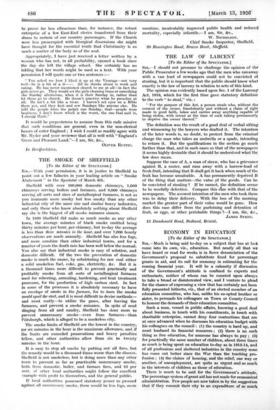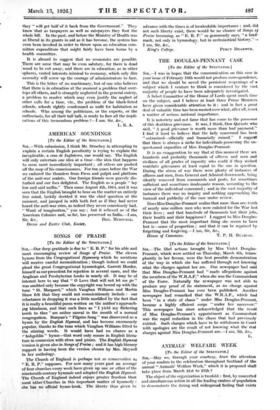ECONOMY IN EDUCATION [To the Editor of the SPECTATOR.]
SIR,—Much is being said to-day on a subject that has at last come into its own, viz., education. But nearly all that we have heard or read for weeks is in fierce denunciation of the Government's proposal to substitute fixed for percentage grants in aid, and its call for economy in estimating for the coming financial year. It will be a calamity if discussion of the Government's attitude is confined to experts and enthusiasts, neither of whom can be counted upon always to take a broad or disinterested view, and I venture to plead for the chance of expressing a view that has certainly not been fully presented hitherto, viz., that of an elected member of an education committee, who has, unlike his co-opted brother or sister, to persuade his colleagues on Town or County Council to honour the demands of their education committee.
Such a man, versed in public affairs, knowing a good deal
about business, in touch with his constituents, in touch with charitable enterprise, cannot deny four contentions that are at once advanced when he discusses his education budget with his colleagues on the council : (1) the country is hard up, and must husband its financial resources ; (2) there is no such thing as free education, for someone has always to pay ; (3) for practically the same number of children, about three times as much is being spent on education to-day as in 1913-14, and of all professions and sheltered industries in the country none has come out better since the War than the teaching pro- fession ; (4) the claims of housing, and the relief, one way or another, of unemployment, are quite as urgent and as much in the interests of children as those of education.
There is much to be said for the Government's attitude, The percentage system of grant aid has not made for economical administration. Few people are now taken in by the suggestion that if they commit their city to an expenditure of so much they will get half of it back from the Government." They know that as taxpayers as well as ratepayers they foot the whole bill. In the past, and before the Ministry of Health was as liberal in its grants in aid as it has become, the system has even been invoked in order to throw upon an education com- mittee expenditure that might fairly have been borne by a health committee.
It is absurd to suggest that no economies are possible. There are some that may be even salutary, for there is dead , wood to be cut away, and there are in education, as in other !spheres, vested interests inimical to economy, which only dire necessity will screw up the courage of administrators to face.
This is the letter of no reactionary, but of one who believes that there is in education at the moment a problem that over- tops all others, and is strangely neglected in the general outcry, a problem to resolve which may even justify the neglect of other calls for a time, viz., the problem of the black-listed schools, schools rightly condemned as unfit for habitation as schools. Who among the politicians, or the experts, or the enthusiasts, for all their tall talk, is ready to face all the impli- cations of this tremendous problem ?—I am, Sir, &c., L. E. A.































































 Previous page
Previous page